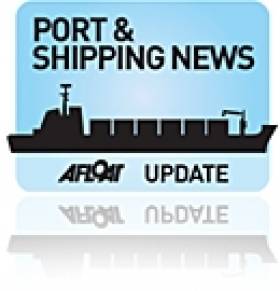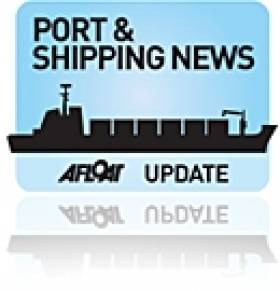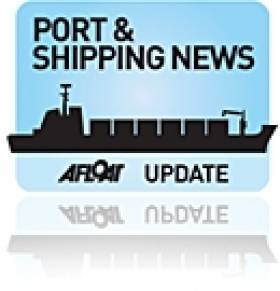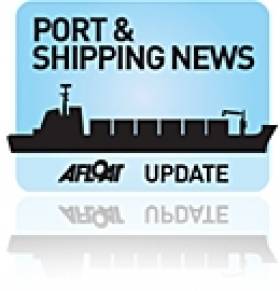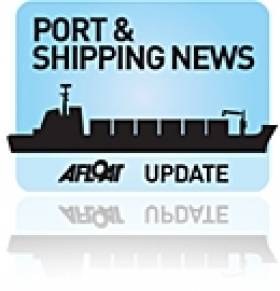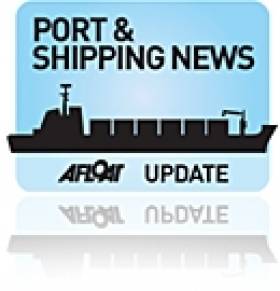#PortRegulations - This week, MEP and Rapporteur, Knut Fleckenstein and the shadow Rapporteurs on the Ports Regulation Proposal have jointly decided not to vote on the Regulation before the EU elections.
Displaying items by tag: ESPO
#WeighingContainers –The European Sea Ports Organisation (ESPO) has welcomed recent decision of IMO's Maritime Safety Committee (MSC) by which it is the shipper's responsibility to submit the verified gross weight of containers before loading onto the ships.
The verification of the containers' weight can indeed play an important role in enhancing safety in maritime transport and the whole transport chain. Ports confirm that misdeclarations of container weight occur and entail safety risks.
ESPO hopes however that the implementation of this new amendment to the Safety of Life at Sea (SOLAS) Regulation in EU and/or national legislation, further clarifies the shippers' responsibility and avoids that in the end this responsibility is transferred to ports and terminal operators. The weighing should take place before entering the port area, and preferably by the shippers at the place of origin.
"We do recognise the importance of knowing the exact weight of containers not only for maritime transport but throughout the whole transport chain. We should look for the most practical solution for all players in the transport chain. But we should at all times avoid that this weighing operation burdens the handling activities in the port and increases the congestion in the port. This could happen if mis-declared container weights are only being detected at a late stage, in the port or port terminal area", said ESPO's Secretary General, Isabelle Ryckbost.
On its 93rd session last month, the IMO's MSC approved the amendment of SOLAS Regulation VI-2 regarding Mandatory Weighing of Gross Mass of Containers before loading onto ships. The committee also adopted relevant guidelines regarding the verified gross mass of a container carrying cargo.
The amended rule requires shippers to submit verified gross weight of containers before loading onto ships and sufficiently in advance to be used in the preparation of the ship stowage plan. Without such document, relevant export containers shall not be loaded onto ships.
The amendment and its guidelines will be effective by July 2016, subject of final adoption by MSC 94th session in November 2014.
Calling Ports!... Are You the Next ESPO Award Winner? on Societal Integration of Ports
#PortAward -This year, European Sea Ports Organisation (ESPO) will be holding their 6th Award on Societal Integration of Ports.
The awards are to address innovative port projects that lead to environmental improvement for the benefit of the wider port and local community.
If you take innovative actions to improve literally the local environment, if your port tries try to respond to the environmental concerns of the population by setting up specific programmes addressing local air or water pollution, or you are doing something against noise or odours from your port, then you could apply for the ESPO Award 2014 and have the chance to make your project known internationally.
Project submissions have to reach the ESPO secretariat by the 1st July at the latest.
The ESPO Award was established in 2009 to promote innovative projects of port authorities that improve societal integration of ports, especially with the city or wider community in which they are located.
In this way, the Award wants to stimulate the sustainable development of European ports and their cities.
For the 2014 competition, the theme 'Innovative environmental projects' was chosen.
Reducing the environmental impact of port operations and improving the local environmental conditions for the people working and living around the port are key success factors for the societal integration of ports. In fact, ports grant and maintain their license to operate and to grow from their local communities.
Therefore, through the award, ESPO hopes to identify and promote innovative projects set up by ports that address the typical port-city concerns in the environmental field such as local air pollution, water pollution, noise, dust, odours.
The organisers warmly encourage you to participate in this year's competition.
Project submissions must be received by the ESPO secretariat by 1 July at the latest. The ESPO Award will be officially handed out during an Award Ceremony and Port Night, which will take place on 4 November 2014 in Brussels.
The following ports were winners over the last six years: the Port of Gijón (2009), Port of Helsinki (2010), Ports of Stockholm (2011), Port of Genoa (2012) and the Port of Antwerp won last year.
For the terms of reference click HERE and application form can be found from this LINK.
#ESPOconference -The European Sea Ports Organisation (EPSO) Conference 2014 concluded last Friday in Gothenburg. A presentation of EPSO's memorandum for the European elections in which European port authorities identify six points of attention for the incoming Parliament and Commission:
1. Important role of transport and ports in the move towards economic growth
2. No ports no industry
3. Ports in the TEN-T policy: from word to action
4. The internal market for maritime transport, no time to waste
5. European ports in an economic, societal and environmental context
6. A ports policy that empowers Europe's ports to meet tomorrow's challenges
There was a clear plea for more clarity on state aid from both the port sector and the Council.
In his keynote speech, the Greek Minister for Shipping, Maritime Affairs and the Aegean and President of the Transport Council, Miltiadis Varvitsiotis, asked the new Commission to come up "with a stable and clear framework for state aid in ports in order to ensure that each investment does not have to be investigated on a case by case basis. This case by case approach causes delays in investments and harms the competitiveness of European ports".
The Commission from its side considers that some basic principles on transparency as provided for in the Port Regulation proposal are a pre-condition for developing a framework on state aid for ports.
In his intervention onIn his intervention on Thursday afternoon, Olivier Onidi, Director for the European Mobility Network in DG MOVE spoke about "a two-step approach".
MEP Knut Fleckenstein to continue his work on the port regulation after the EU elections
In full campaign, the Rapporteur for the Port Regulation proposal, Knut Fleckenstein joined the conference to give his views on the way forward with the Port Regulation proposal after the EU elections. He stated that there should be more flexibility when it comes to the setting of port infrastructure charges, the consultation bodies and the supervisory body. On the other hand, he was calling for a stricter framework on transparency in port accounts.
Mr Fleckenstein stressed he wanted to continue to work on the Port Regulation proposal. He stated that all main policy players had or would be changing in the coming months: the shadows, the Commissioner, the Director General.
Ex aequo on the basic conference question: level playing field, a must or a myth!
For the first time, participants were invited to express their opinion on the different topics of the conference through an online voting system. The vote on the main theme of the conference gave a 50-50 outcome. For half of the audience, the level playing field between ports is a must, for the other half it is a myth.
Participants were very active on twitter. Under the hashtag #ESPOConf2014 you can follow all tweets and pictures from the conference.
"We can look back at a successful conference and event here in Gothenburg. We are happy that the Council is helping us in putting the state aid guidelines for ports on the political agenda. The presence of both the Commission, the Parliament and the Council allowed us to have a good debate on the best policy for European ports. We hope to continue this constructive dialogue with the incoming European Parliament and Commission", said ESPO Chairman, Santiago Garcia Mila.
The next edition of ESPO's annual conference will take place in Piraeus on 21 and 22 May 2015.
European Sea Ports Organisation Welcomes First Reading Agreement on Clean Fuel Strategy
#CleanFuels - Negotiators for the European Parliament and the Council reached an informal first reading agreement yesterday on the Clean Fuel Strategy. If confirmed by EP's Transport Committee and Plenary, the Directive could still be adopted before the EU elections and finalised under the Greek Presidency.
"We would like to congratulate the negotiators for reaching this agreement. European ports and stakeholders now have a clear view of what is expected from them and can start or continue working towards that goal. The obligations foreseen in this Directive imply quite some investments and planning for the port authorities and port industry. We are convinced that this Directive together with the funding opportunities that will be offered under the forthcoming TEN-T calls will enhance the use of cleaner fuels in maritime transport in a realistic way. We also believe that a lot of ports will not wait for 2025 to meet the obligations of this Directive", said European Sea Port Organisation (EPSO), Secretary-General Isabelle Ryckbost.
The two issues of importance to ports in this Directive are the framework for the supply of shore side electricity and the obligations as regards the provision of refuelling points for LNG in ports.
On shore side, Member States must ensure that the need for shore-side electricity supply for inland waterway vessels and sea-going ships in maritime ports is assessed in their national policy frameworks. Such shore-side electricity supply shall be installed, as a priority in ports of the TEN-T Core Network, and in other ports, by 31 December 2025, unless there is no demand, the costs are disproportionate to the benefits, including environmental benefits.
As regards the LNG refuelling points, Member States must ensure that an appropriate number of refuelling points for LNG are put in place at maritime ports to enable LNG inland waterway vessels or sea-going ships to circulate throughout the TEN-T Core Network by 31 December 2025 at the latest. Member States must cooperate with neighbouring Member States where necessary to ensure adequate coverage of the network.
The EP key players on this proposal are stressing that they are willing to take up the work again after the elections and express the wish that the newly elected Transport Committee takes stock of the progress made so far on this file and continues the work.
"We understand that achieving a good compromise on such a controversial file in such a short time frame, especially in the run-up to the European elections is not an easy job. We are pleased that there is a clear will from the main players on this file to continue the work after the elections, away from any electoral pressure." said European Sea Ports Organization (ESPO) Secretary General, Isabelle Ryckbost in a reaction to the postponement.
She added "We are looking forward to continue the constructive dialogue with the Parliament, Commission and Council in view of obtaining a balanced result that means a step forward for every single port in Europe".
ESPO urges EU Parliament and Council to reach Agreement on Clean Fuel Strategy before EU Elections
#CleanFuels- The EU's parliament and council are to discuss in a meeting today the so-called "trilogue" on the Clean Fuel Strategy to reach a compromise and find a solution on the outstanding issues.
If necessary, another trilogue is foreseen in two weeks-time. If an agreement can be found, it can be endorsed by the Parliament before the elections.
European Sea Port Organisation (ESPO) fully supports the Clean Fuel Strategy proposal as a way to promote and enhance the use of alternative fuels as a means to further improve as much as possible the environmental footprint of the different modes of transport.
"This strategy is important because it sets out a plan for Member States and stakeholders to work towards alternative fuels. We hope that this strategy is finalised soon, in view of giving the different stakeholders a clear sign on where to go and allowing them to start or continue working towards that goal. We therefore urge the Parliament and the Council to do everything possible to reach a first reading agreement", says ESPO's Secretary-General Isabelle Ryckbost.
Two of the issues under discussion are of importance for seaports: the deadline for the provision of LNG refuelling points in core network ports and the conditions under which shore side electricity has to be provided in ports.
European ports are in favour of the pragmatic approach that is taken by both European institutions regarding the deployment of LNG refuelling points in core TEN-T ports. The aim here should be the deployment of a sufficient network of LNG refuelling points taking market realities and distances between ports into account.
ESPO agrees with the Parliament that it makes sense for such an LNG refuelling network to be deployed already by 2020 in consistency with the entering into force of the sulphur Directive. It is of outmost importance though that the relevant co-funding possibilities for LNG projects are ensured also after the 2014- 2020 period.
As regards shore side electricity, ESPO considers a compromise obliging core TEN-T ports to provide shore side electricity wherever there is demand, the costs are not disproportionate to the benefits and there is significant positive impact on the environment, as acceptable for both institutions.
The deadline for meeting this obligation is of a lesser importance to ESPO. If, as a result of an assessment it seems that shore side electricity is the most viable solution for the whole or a part of the port, ports should not wait until 2020 or 2025.
Over the last years, and in absence of any regulatory obligation, several European ports have been actively supporting this technology and exploring the possibility of providing shore side electricity in their berths. In some cases, this has lead to successful implementation projects.
At the same time, shore-side electricity must be seen as one of the pillars of a more comprehensive clean fuel strategy and might in that respect not always score as the "best" solution in terms of environmental benefits in all ports or on all berths. Ports must assess the full picture and look at this technology in combination with LNG and other upcoming innovative solutions.
"The aim of this Strategy should be to push ports to reflect as soon as possible on their way to enhance the use of cleaner fuels. Shore side electricity is certainly one of the pillars of such a strategy and reflection. If cost-effective and wherever it comes out as the best environmental solution, it should be installed. But we should not see this technology in isolation.
For berths where only LNG fuelled ships are arriving, such a technology is completely redundant. It is also clear that technologies in the field are evolving constantly. We should give ports the possibility to adapt to and invest in those as well", adds Isabelle Ryckbost.
EU Parliament's Vote on Transport Infrastructure Plan and Budget Agreed
#EUtransTEN - The EU Parliament gave its final agreement on the European budget envelope for 2014-2020, the Trans European Network (TEN-T) and for financial Regulation, the Connecting Europe Facility.
EPSO, the European Seaports Organisation welcomed the Parliament's vote. This decision defines the EU's infrastructure policy for the coming decades and establishes a budget of €23.17 billion earmarked for priority transport projects for the financial period 2014-2020.
This means that the budget for financing transport infrastructure will be tripled compared to the last period (2007-2014). More than 320 sea ports feature on the new TEN-T maps and 94 ports are part of the core network.
ESPO's Secretary General Isabelle Ryckbost said: "This vote is an important step towards establishing a real transport "network". We fought hard to defend this budget and to have our ports well represented in the network and network corridors. We now look forward to see a fair share of these funds used to improve Europe's port infrastructure and to better integrate these core nodes in Europe's transport network. There is a plan, there is a budget".
She added, "Let us now start looking at the implementation. The core network corridors structures will be powerful instruments. I do hope ports will have their say in the set up and functioning of these corridor structures. Moreover, as ESPO we must also focus on the Motorways of the Sea priority. If well used, it can be an important instrument to increase intra-EU maritime transport and strengthen the cooperation between European ports".
ESPO Welcomes EU Parliament Vote on Ship-Recycling
#ShipRECYCLING - The European Parliament has adopted the new Ship Recycling Regulation by a large majority at a meeting in Strasbourg.
The final text is the result of a compromise reached last June between the Council under the Irish Presidency, the Parliament (Schlyter report) and the Commission.
The new EU Regulation will allow ships flying the flag of an EU member state to be scrapped outside the EU provided that strict standards are met. These standards effectively mean the end of "beaching" where ships are simply taken apart on a beach, with consequences for human health and the environment.
Regular inspections, Commission assessments and an increased role for NGOs will assist ensuring compliance with these standards. Finally, under the new Regulation, the Commission is required to come up with a proposal on the feasibility of an incentive mechanism 3 years after entry into force.
Isabelle Ryckbost, Secretary General of ESPO welcomed the balanced outcome of the political process on ship recycling. "Conscious ship recycling is an important issue with serious social and environmental impacts. In that respect, ESPO urges Member States to ratify soonest the 2009 Hong Kong International Convention for the Safe and Environmentally Sound Recycling of Ships, allowing its global application".
"Furthermore, we remain at the disposition of all parties involved in view of further discussing the appropriate application of the polluter pays principle in ship recycling".
The legislative text will be formally adopted by the Council in the near future.
ESPO’s To-Do List for the New TEN-T
#ESPOTenTlist- The European Commission this week is gathering with all transport stakeholders in two Baltic Sea capitals, Helsinki and Tallinn for the 2013 TEN-T days.
The event comes at a very timely moment for a discussion on the way forward for the new TEN-T policy as well as its funding mechanism, the "Connecting Europe facility", which are just waiting their final adoption.
European Sea Ports Organisation (ESPO) welcomes the imminent adoption of the new TEN-T policy. The new European transport infrastructure framework is, indeed, fully recognising the importance of ports as crucial nodes of the network. It can further optimise the links between sea ports and their hinterland through the multimodal corridor approach.
In view of maximising the success of this new policy, ESPO asks its members to fully benefit from this new infrastructure policy. Ports should participate entirely in the multimodal corridor approach that has been put forward by the European Commission and should submit projects. Moreover, by giving hands-on information to the Commission about their investment needs, European ports can contribute to obtaining an efficient and sustainable multimodal European Transport Network.
ESPO believes, in that respect, that European port authorities should be adequately represented in the governance structures of the multimodal corridors and actively participate in their implementation. All corridors start and end in European ports. Therefore, European ports are key actors and this should be reflected in an active involvement in the planning and development of the corridors.
Roads should not be completely neglected as ESPO further stresses that since improving road access to ports is an important element in enhancing maritime transport and hence multimodality in some areas.
In addition, for European ports, Motorways of the Sea (MoS) is a crucial aspect of TEN-T. MoS can strengthen the link between the comprehensive ports of the network and the core ports and multimodal corridors.
It is important to define more precisely how this concept will be applied in the context of the new TEN-T policy. This could and should be done in close cooperation with the ports and their experts, who deal on a daily basis with short sea shipping.
Finally, to really boost the Motorways of the Sea between European ports, the Commission and Member States should step up efforts to realise the full internal market of maritime transport and to ensure efficient custom procedures in all European regions and ports.
"We entirely support Europe's new TEN-T policy and see it as a good basis for further developing Europe's transport infrastructure into a fully fledged multimodal, efficient and sustainable network in which ports are the cornerstones. The delivery of this new policy will however depend on its implementation.A lot of aspects still need to be clarified." says ESPO Secretary General, Isabelle Ryckboat.
"ESPO and its members are prepared to give input and look together with the other stakeholders and the Commission for the best ways to ensure a full application of the goals of this new TEN-T policy. We hope in that respect that ports will be heard and that they will play the role they deserve in the multimodal corridor".
#Port Policy – The Transport Committee of the European Parliament yesterday had a first exchange of view on the Commission Proposal for a Port Regulation, which was published in late May.
The European Sea Ports Organisation (ESPO) acknowledges that the Commission proposal addresses some important conditions for ensuring port cargo handling on a level playing field:
by tackling the transparency of financing in ports, by recognising the freedom to provide port services by considering the setting of charges and the minimum requirements for port services as important tools of port management.
But the Commission proposal disappoints, since it partly undermines those principles:
by intervening in the commercial freedom of ports and port authorities to vary charges according to the port management's economic strategy;
by prescribing how ports and port authorities should deal with their clients;
by imposing additional administrative burden to ports which are not competing at the European scene;
by creating an independent supervisory body.
In that overall context, ESPO and its members cannot accept the regulation proposal as it stands.
"We welcome the fact that the Commission is considering European ports as engines for growth. European ports are facing enormous challenges: growing volumes, ever-increasing ships, further globalisation, increasing societal and environmental pressure. They need a policy that empowers them to meet these challenges, not rules that create additional burden for ports without real benefit for the port industry or the users. We hope European policy makers understand our concerns and want to work with us in view of obtaining a framework that means a step forward for every single port in Europe", says Isabelle Ryckbost, ESPO's Secretary General.
ESPO fears that the Commission proposal in its current form will hamper well performing ports:
The diversity of the European port sector makes it impossible to frame all ports and their managing bodies within one stringent legal framework, without giving in on their specificity and on the particular role ports are playing for their national and regional economy.
Differences in size, geographical situation, governance, tasks, financial situation, etc. makes it very difficult to develop a set of rules that goes further than guiding principles.
Moreover, by restricting the commercial freedom of EU port authorities and interfering in port-related governance competences, the Regulation proposal could hamper the necessary transition of European port authorities towards dynamic port developers and worsen the position of ports which are already high performing.
Finally, European ports do not see the port regulation as the instrument that will improve the competitiveness of ports.
There are other, more important, factors that can enhance the level playing field in the port sector that need to be tackled: internal market for maritime transport, environmental rules affecting transport patterns and modes, unfair competition with third neighbouring countries, and burdensome customs procedures.
ESPO's full response to the proposed Port Regulation can be found HERE..


























